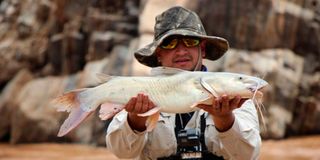Stop it! This is how pollution has wiped out fish from our rivers

Muffadal Alibhai with a Widehead Catfish - Clarotes laticeps- caught in the Tana River. He says they were once abundant, but these apex predators are now disappearing from our river systems.
What you need to know:
- In the course of his work, Muffadal Alibhai Shabbir has witnessed first-hand pollution of water bodies.
- Shabbir uses his social media accounts to educate the public on the fish species that are now hard to come by.
Muffadal Alibhai Shabbir has been a fish fanatic since he was young. Growing up, he would accompany his parents to various fishing sites, developing interest in fish.
And when he grew up, the sportfisherman started to traverse the country exploring various aquatic ecosystems – from lakes to rivers and oceans – in a bid to catch and identify the various fish species.
Initially, the sportfisherman-turned conservationist, says it was easier to find the different species of fish like elephant snout, the Nile puffer and Sudan, squeaker and wide head catfishes as well as Lake Chala tilapia, Pangani barb and Tiger fish in rivers across the country.
“But right now you can’t find these fish in our natural water bodies due to increased pollution in particular, deforestation and now climate change,” says Shabbir.
In the course of his work, he has witnessed first-hand pollution of water bodies, with the toxins decimating fish populations.
“When I was young, I could go fishing in rivers such as Mbagathi and Athi and catch a sizable variety of fish. Kenya has over 200 fresh water fish species, one could not miss any,” he says.
But things have changed for the worst that there is hardly any fish.
“All the rivers in Nairobi are polluted, they are just sewers. There is hardly any life left in there, you cannot swim and fish cannot thrive.”
Shabbir, an independent conservationist who works as a volunteer research associate with the National Museum of Kenya (NMK), traverses the country to document the remaining fish species. He says the situation is dire.
Rampant pollution
“We are losing it. The rate at which forests and trees are being cut and the rampant pollution that is going on has wiped out aquatic life in most rivers. I have documented all this for NMK.”
Shabbir, who studied tourism management and has turned a fish ambassador, catches, identifies, tags and releases back into the water some of the fish. He also donates some to NMK for posterity.
However, in Nairobi, he does not catch the fish in the main rivers but in private dams, small tributaries, parts of protected rivers within Karura and Oloolua forests and a few surviving in swamps. In these water bodies, he says, one can catch Barbus and mudfish, the most resilient species.
“Having fish in a water body is a bio-indicator of a good water body. Fish have numerous benefits in a water body. They are nutrient recyclers, release waste for growth of aquatic plants and transports nutrients and seeds for regeneration of life.”

Muffadal Alibhai Shabbir tries to catch fish at Paradise Gardens dam in Kiambu County.
“You don’t like malaria? Then save your fish. They consume a lot of mosquito larvae keeping the disease at bay,” he adds.
To protect the fish, can we domesticate some of the endagered species?
“I don’t see it working. Our major dams are all fed by rivers... Our lakes are all fed by rivers and our fish farms depend on rivers,. So even if we do it, for how long. Fish should live in its natural habitat. The thing is let’s stop the pollution.”
Hesborn Moogi Nyambati, a senior animal health assistant at Nairobi Snake Park and Aquarium, says fish feeds on dead matter and waste from hippo, crocodile and other aquatic animals.
“In the absence of fish, we could have in excess things like frogs. They balance the ecosystem,” Moogi states.
Conserving fish
Though there are fish species that can survive in polluted water, such as catfish, majority are omnivores – feeding on plant and animal matter, he adds.
Shabbir uses his social media accounts to educate the public on the fish species that are now hard to come by.
To conserve fish, he says Kenyans should move away from the image of fish as food only.
“That will help us conserve them. We should look at fish as something that needs protection, otherwise our children will not see some of these revered species.”
Since he started the job, he has documented over 60 fresh water fish species in various water bodies, but a good number of them are no longer available.
“If the situation persists, the depletion of wild fish will eventually affect fish farming because of continued inbreeding. Inbreeding causes defects, leading to poor quality breeds.”
He says people need to be educated on the roles played by fish in the entire ecosystem.
“Government agencies in the sector must work in cohesion to ensure our most valuable resource is protected and not destroyed and wasted through pollution.”
“There should not be an excuse to release sewage into our rivers as this kills all aquatic and terrestrial wildlife, impedes agriculture and depletes drinking water,” he concludes.





